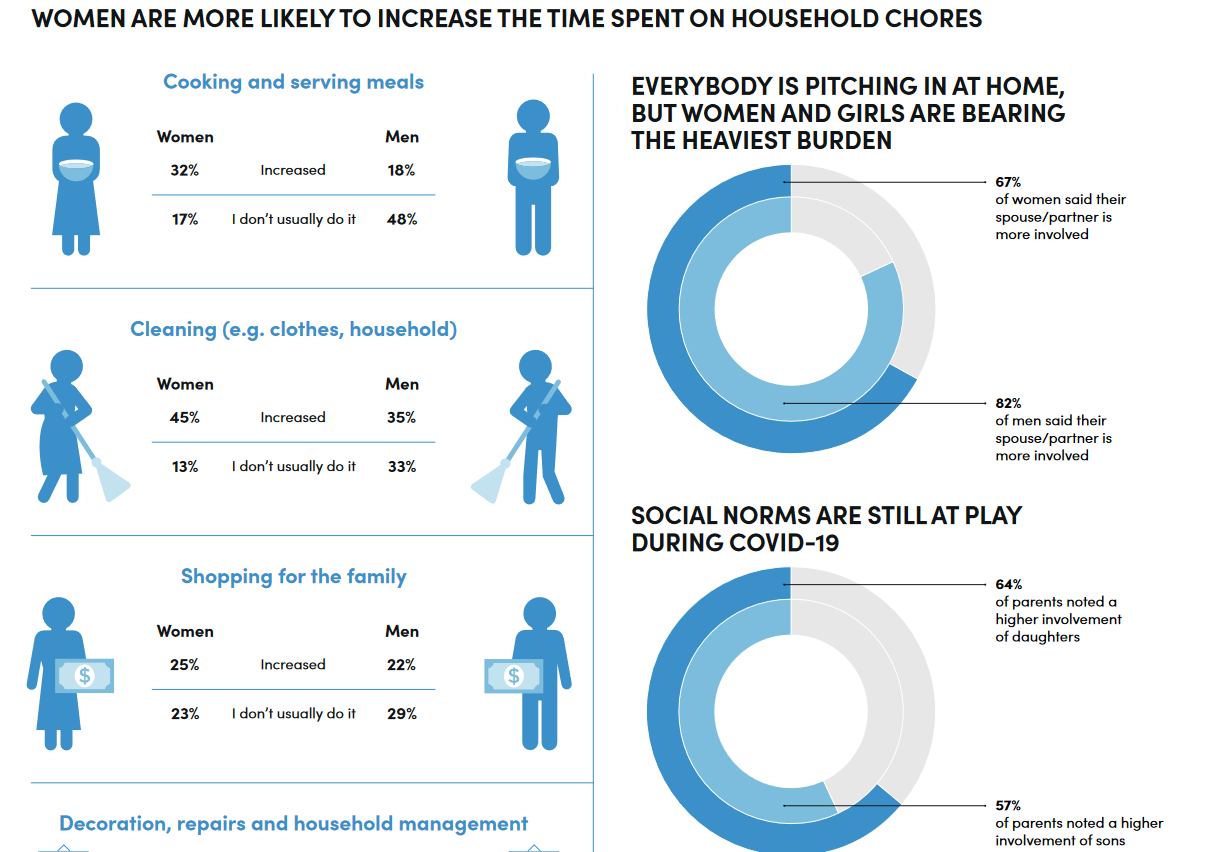Your Wife Isn't Nagging; You're Slacking

Women do 2.6 times the amount of unpaid work than men do
Despite progress made in gender equality, there is still much left to be desired.
As lockdowns forced men and women to work from home, an unexpected consequence took place. All the progress of gender equality in the workplace and in household maintenance began to unravel.
COVID-19 meant parents had to juggle more responsibilities. They worked from home and looked after their children without childcare. However, women found themselves bearing the brunt of the extra unpaid labor.
Women are sold the idea that "Women can have it all." What they mean is that they can be the role model worker and the perfect mother. If only it was that simple.
The problem with this idea is that it places that pressure directly on women. If you don't have it all, it is viewed as a personal failing.
While women have more opportunities in the workplace than before, it ignores the pervasive imbalance between men and women.
Mothers worried more than fathers that their work performance was being judged negatively because of the impact of their caregiving responsibilities. They worried about not being available all the time or having to take time off work due to family matters. Women feel the need to go over and beyond in their workplace.
And they are right to worry.
Research shows that motherhood triggers false judgments from others, that they will be more focused on their children and their job. The assumptions are that they will be less competent, committed, and productive at work.
Women of childbearing age are hired less often and passed over in promotions because of these assumptions.
Women face more criticisms from work, while balancing more unpaid household tasks and childcare.
The Statistics
The United Nations estimated that women do 2.6 times the amount of unpaid care and domestic work than men do.
What is this unpaid work?
It is the childcare, cooking, cleaning, being the family chauffeur, and looking after the aging parents.
So what do men do?
According to the Department of the US Department of Labor, men in the US spend more time than women exercising, playing games, and enjoying leisure time.
During the pandemic, COVID-19, this inequality was further highlighted.
UN Women did a study involving 16 countries to compare time spent on childcare during COVID-19 by sex.
Before the pandemic, women spent 26 hours per week looking after children, compared to 20 hours a week for men. That increased during COVID-19 by 5.2 hours for women, and only by 3.5 hours for men.
That means that during COVID-19, men are still not doing as much as women did pre-COVID. And this is only looking at childcare, not counting other household tasks and chores.
Women are doing the equivalent of a full-time job of unpaid childcare.
The Consequences
The consequences of this inequality have brutal effects on women.
Employment Prospects
Unpaid care work is a significant factor in determining whether women enter and stay in paid employment. Significantly more women than men lost their job during the pandemic. During COVID-19, mothers were significantly more likely to drop out of the workforce to take care of the unpaid labor tasks.
Building Careers
Women have less time and energy to dedicate to furthering their careers. With less free time, women don't have the same opportunities to learn new skills, improve resumes or apply for jobs.
When women are passed on for hiring or promotional opportunities, this leads to a vicious cycle. They earn less and therefore are more likely to put their career on hold to look after children. Putting their careers on hold means they have less experience and less time to work up the ladder compared to men their age.
Mental Health Issues
Unpaid care work is undervalued and underappreciated. This burden contributes to greater mental health issues and poorer quality of life.
Many women report feeling burnout from the pressures of balancing work and home life.

It's generational.
Not only are women feeling this inequality, but girls are too.
Between the ages of 5-14 years old, girls spend 40% more time on unpaid household chores than boys their age. As they get older, this inequality increases to 50% more than boys their age.
Collectively, girls spend 160 million more hours than boys doing household chores every day.
Just like the impact on women and their work, the time spent on chores means less time playing, socializing, and studying. This has a negative effect on a girl's future career.
How to Shut a Nagging Wife Up
If you google "nagging," the autofill suggestions are heartbreaking and infuriating.
- how to shut a nagging wife up
- how to deal with a nagging wife
- how to shut up a nagging wife
- how to stop nagging
- how to stop nagging your husband
- how to get husband to do chores without nagging
- what does bible say about a nagging wife
Women disproportionally carrying the mental load or the emotional labor.
What is the mental load?
Mental load or cognitive labor refers to the invisible, non tangible tasks that are necessary to run a household. It involves things like:
- keep track of bills need to be paid, when children need to go to doctors, extracurriculars, school appointments
- keeping track of what chores need done and when
- purchasing and wrapping gifts for loved ones
- scheduling date nights, visiting family or friends
- keeping track of what groceries need to be bought
Women often fall into the role of "house manager" ensuring that which tasks get done and when. It's a role they are forced into and a role many men place them into.
As "house manager," part of their unwanted responsibility is reminding their male counterparts of their (fewer) responsibilities.
Except, they don't see it as reminders. Men call it nagging.
What's wrong with the term nagging?
Nagging has become a weaponized term to criticize women who remind men to do their part.
If men call it nagging, women are likely to remind them less.
Women remind them less, men contribute less.
Men contribute less, women pick up more.
Which is what they want.
By calling it nagging, men can become the victim in the scenario.
By calling it nagging, the women are the problem, not their lack of contribution.
What can we do to balance unpaid labor?
1. Talk about it.
Talk about it with your partner, with your friends, and with your family.
Discuss the inequalities. Be open about them.
Discuss how much you do and how much they contribute. How do you feel about the division? Where could improve? Talk about household chores and the invisible mental load.
2. Don't pick up the slack.
Ever heard of "weaponized incompetence?"
Weaponized incompetence, or strategic incompetence, refers to when someone uses fake or deliberate incompetence to avoid doing an unwanted task. It is doing something poorly, forgetting to do it, or insisting that the other person does it better.
By picking up the slack whenever he "forgets" or by having to re-do the task entirely because he didn't do it right, he is learning you will always do so.
Do it enough and it is no longer his responsibility but yours.
3. Break the cycle
Regardless of their gender, treat your children the same. Give them the same chores and responsibilities. Teach them to recognize and speak up when they see inequality.
4. Challenge Policies
If you are in a position of hiring or promoting power, recognize what internal biases you may have about women.
It is important for both men and women to have paid leave for the birth & adoption of children.
Both men and women would benefit from more flexibility in their working schedules to adapt to the needs of their families.
Conclusion
Inequality of division of unpaid labor continues to be a significant issue in gender inequality. Unpaid labor is grossly underappreciated and undervalued. A consequence of that is the term "nagging." With its sexist undertones, the term has become a weaponized way of silencing women. It perpetuates the idea that men shouldn't have to do as much unpaid labor as women.




